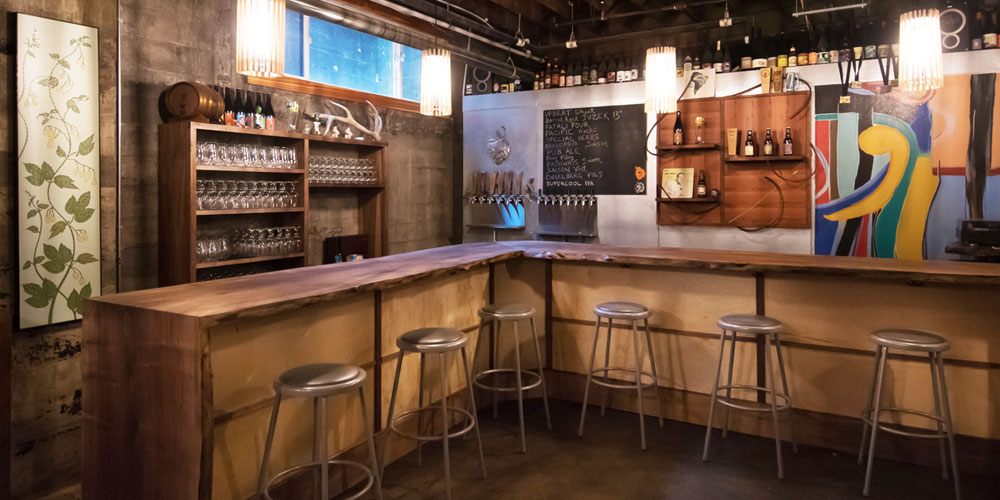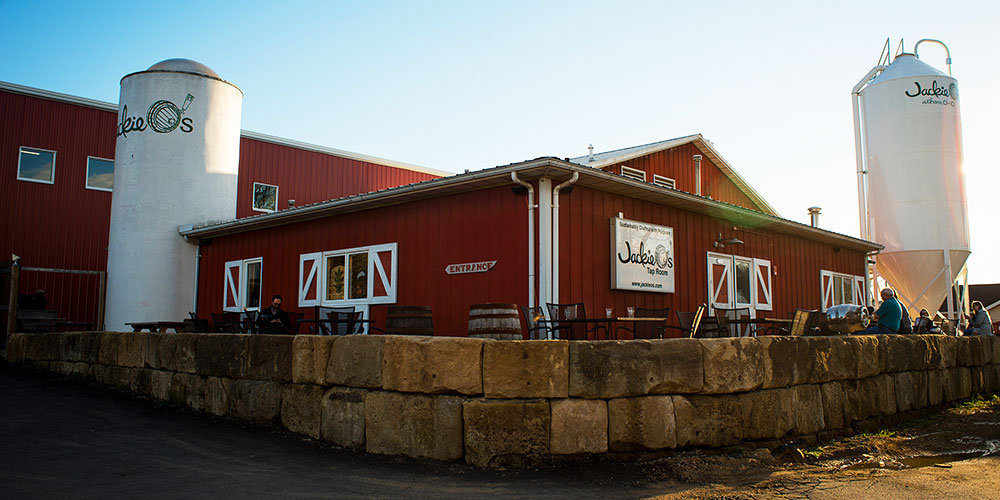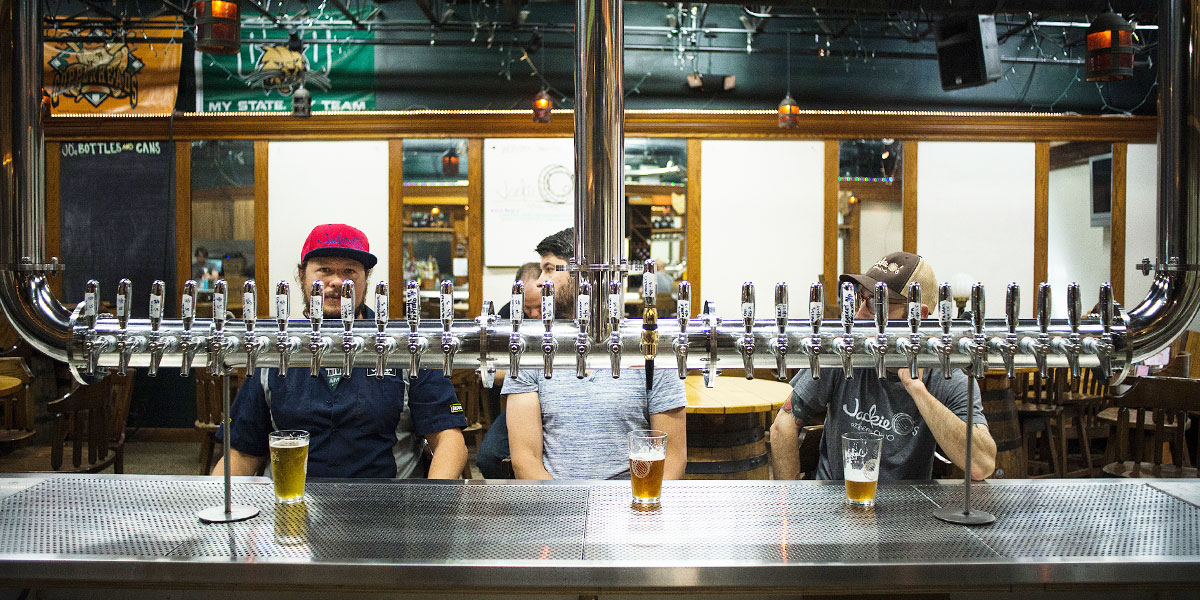The average American lives within 10 miles of a craft brewery, according to the Brewers Association. With more than 6,400 small and independent breweries in the U.S., it is easier than ever to discover new brews. Despite their size, many of these breweries punch above their weight as stalwarts in their communities, and have chosen to invest more in people and less in tanks. Staying small and local is part of the design. Here are the stories of four breweries who are happy to remain small.
[newsletter_signup_box]
Jester King Brewery in Austin, Texas
Jeffrey Stuffings founded Jester King Brewery in 2010 on a small tract of land leased from a ranch outside of Austin. His inspiration:To create a brewery that modeled the farmhouse ales of western Europe, brewing beer that he describes as inextricably linked to place and time.
“We had a quest for authenticity with our beers,” Stuffings says. “A lot of beers marketed as farmhouse use water that is manipulated, and grains and hops that come from the same place as everywhere else.” Not so with Jester King. Its water comes from the property’s well, the grain comes from central Texas farmers, hops are dried in the brewery barn, and many of the adjuncts are grown either on the property or by local farmers.
(MORE: Jester King Founder Speaks Out on Beavertown/ Heineken Deal)
While the brewery’s geographical footprint has grown over the years from that small plot of leased land to now owning all 165-acres of the ranch, its barrelage output has not. It’s capped at 2,000 barrels a year. “To make beer the way we want to, by capturing terroir, we need to stay this size,” Stuffings says.
That doesn’t mean Jester King doesn’t have visions for the future. The brewery just focuses more on the land than the beer.
“The area around us is becoming more and more residentially developed and commercial development is catching up,” Stuffings says. “It’s feeling less and less rural. Now that we own all 165-acres, we want to create non-obtrusive, sustainable fun.”
Next month, Jester King plans to open free hiking trails to the public and is in the works of opening its own restaurant. Other future plans could include camping, cabins, a cheese shop, a butcher, a winery and a meadery.
“There’s some altruism in terms of preservation. We want to create something that is sustainable for a lifetime if not longer,” Stuffings says.
Upright Brewing in Portland, Oregon
So far, 2018 has been a big year for Portland’s Upright Brewing. It won two medals in the highly contested Oregon Beer Awards — a silver for its Dirty Passport smoked lager and a gold for its mixed fermentation Pathways Saison. Yet, with all eyes on the 9-year old brewery, founder Alex Ganum plans to do something almost unprecedented. He plans to shrink barrel output from 1,200 barrels a year to 1,000. His decision comes down to two factors: lifestyle and beer.
“There’s something to be said about being small and still doing more hands-on work,” Ganum says. “I can’t tell you how many times I talk to brewers who started small and are now at 15,000 barrels. They’re stuck behind a desk all day not using their hands. They’re managing 30 people instead of three. That’s just no fun.”
Instead, Ganum is proud of the fact that his brewery only employs three people, and they each have their hands on everything.
(Analysis: Hemp Ales Grow in Popularity as Brewers Aim for New Flavors and Awareness)
“We’re not in it to make a million bucks,” Ganum says. “It’s a lifestyle thing. I want to make sure we (my guys and I) can live comfortably in Portland with reasonable hours, flexibility and weekends off. We can drive to work with smiles on our faces.”
A lot of that fun has to do with a focus on the beer. As Upright moves to a more taproom-centric business model that many breweries today are shifting toward, the brew team is focusing more on its barrel program.
“We want to keep the tap list as interesting as possible,” Ganum says. That philosophy even extends to the brewery’s flagships, like the Pathways Saison, made from different barrel-aged pale saisons. Even its flagship IPA — Supercool — can’t be normal.

“It’s fermented with two saison yeasts in an open fermenter,” Ganum says. “It’s unique but just accessible enough for IPA drinkers.”
Looking toward the future, Ganum sees more of the same. “People just expect that you want to expand. We’re way more focused on having a good time. In our ideal world, we’re setting this place up to rock out for decades and riding it out for our whole lives.”
Double Barley Brewing in Smithfield, North Carolina
Double Barley Brewing wears its heart on its logo with the company slogan of “Small Town, Big Beer.” It is why you’ve probably never heard of Smithfield, North Carolina. For the Western North Carolina uninitiated, it’s a blip off of Interstate 95. “We chose this spot to become more of a destination brewery,” says Cheryl Lane, whose business card reads Head Trouble Maker.
The brewery — which specializes in high-ABV and dark beers — opened in 2013. It saw tremendous growth in those first few years. Then, as competition in North Carolina increased and shelf space became more coveted, the brewery experienced the slowdown felt by many. That is fine by Lane, who, along with her husband, Larry, opened the brewery with the idea of it becoming a community space. “We designed the brewery to bring people together,” Lane says.
Thus, Double Barley offers its second-floor event space to community groups like the Junior Women’s League and Adopt-A-Cop for free. The brewery also hosts charity events each month, works with local farmers and food purveyors to source ingredients for both the brewery and the kitchen. And offers up walls for local artists to sell their wares. “The advantage of having your own business is creating the environment you wanted when you were working for someone else,” Lane says.
(Find: A US Brewery Near You)
The focus on the taproom also allows Double Barley to keep it fun by hosting events like the recent Thrilla Fight Series, where the brewery paired variants of their popular Thrilla In Vanilla Porter against each other. Other unique events include a barbecue cookoff for charity, Christmas in July, GOUGE Wrestling, pet adoptions and more.
“It’s different for us,” says Lane on the brewery’s future. “We have a full life with family. When I was young, I didn’t mind working hard. Now, we want to grow to the point where we don’t get divorced or die of a heart attack.”
Jackie O’s in Athens, Ohio
“Even though we crossed that 15,000-barrel threshold to be considered a regional brewery, we still don’t consider ourselves to be a regional brewery,” says Art Oestrike, founder of Jackie O’s. Instead, he prefers the moniker of Ohio’s brewery. “If 95 percent of our beer stays in Ohio, that’s perfect.”
In fact, many regional breweries are surprised to learn that Jackie O’s, which employs more than 120 full and part-time workers in southeast Ohio, is as large as they are.

“People are shocked that we brewed 6,000 barrels of Mystic Mamma last year,” Oestrike says. “They don’t believe it’s possible because we don’t send any of it out of state. But, it’s in several thousand accounts in Ohio.”
Becoming Ohio’s brewery wasn’t something that Oestrike planned in 2005 when he bought what was then O’Hooley’s, a brewpub. He has a rabid fanbase of Ohio University alumni to thank for his success. “More than 60 percent of OU students find themselves back in Ohio within a year of graduation,” Oestrike says. “A couple of homecomings in a row, people were begging for our beers.”
Even with recent success, Oestrike has put the brakes on growth in 2018. Instead of investing in quantity, the brewery is dialing it back and focusing on quality. He is installing a better bottling line, a centrifuge and a pasteurizer.
“I can’t believe we don’t have any stainless-steel tanks on order for the first-time in five years,” Oestrike says.
It’s all in an effort by Oestrike to build a legacy.

“Do we get a little jealous when a brewery that’s only two or three years old is brewing more than us?” Oestrike says. “Yes. But I don’t want that debt. I want to be here in 20 years. We live in a very impoverished area and we want to make an impact. Two of our employees bought houses this year.”
Two years ago, Jackie O’s launched a health care plan, one of the biggest employers in the area outside of the state to do so.
And that’s where Oestrike sees the future of Jackie O’s. It’s not in opening brewpubs throughout the state, but in creating opportunities in Athens County and southeast Ohio. Whether that is at the brewery’s farm or with offshoots like the bake shop, Oestrike says only time will tell.
CraftBeer.com is fully dedicated to small and independent U.S. breweries. We are published by the Brewers Association, the not-for-profit trade group dedicated to promoting and protecting America’s small and independent craft brewers. Stories and opinions shared on CraftBeer.com do not imply endorsement by or positions taken by the Brewers Association or its members.


Share Post